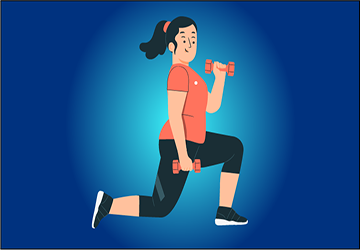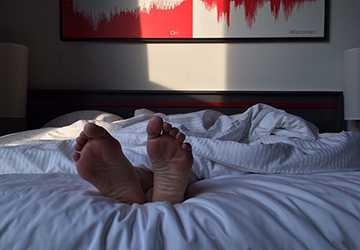Introduce:
Did you get enough sleep? Are you all too familiar with waking up to your alarm clock at night or early in the morning? Your lifestyle can be one of the most significant contributors to sleep deprivation! Sleep is an integral part of life and affects physical and mental health. However, many factors surrounding our lifestyle can positively or negatively impact it. From maintaining a consistent bedtime to including certain foods in our diet, our daily choices affect the quality and quantity of our sleep. This blog post explores how our lifestyle affects short- and long-term sleep. We also share tips on optimizing your lifestyle for restful sleep and dive into some benefits of healthy sleep habits. So if you want to improve your sleep, read on!

Let's take a look at how lifestyle affects sleep
Lifestyle choices can significantly affect the quality of your sleep. Behavior, eating habits, and activity levels are critical to getting a good night's sleep. Below we discuss in detail how lifestyle affects sleep quality:
1: Nutrition –
Eating a large meal late or before bedtime can lead to indigestion and difficulty falling asleep. Eating a healthy, balanced diet rich in vegetables and avoiding caffeine and alcohol before bed will help ensure a good night's sleep.
2: Activity Level –
Regular physical activity can improve the duration and quality of your sleep. But exercising too close to bedtime can keep you awake, so allow at least a few hours between your last workout and rest.
3: Behavior –
Behaviors such as looking at screens or engaging in stimulating activities before bed can affect your sleep patterns. Avoid electronics an hour before bedtime, and ensure the room is dark and quiet for a good night's sleep. Small lifestyle changes can help improve your sleep habits and provide a good night's sleep.
4: Pressure –
High stress can affect your ability to fall asleep. Learning to manage stress is essential to getting a good night's sleep. Make time before bed to relax, meditate, or practice yoga every night. This helps reduce stress and makes rafting easier.
5: Environment –
The environment in which you sleep also matters. Investing in a comfortable mattress and pillows and ensuring your bedroom is at the right temperature will help ensure a good night's sleep. Additionally, blocking out noise with earplugs or a white noise device can improve sleep quality.
Developing healthy habits is crucial to getting a good night's sleep. Eating a balanced diet, exercising regularly, managing stress, and creating an environment conducive to sleep are all critical factors in helping you get the rest you need. So try these tips to create an environment conducive to a good night's sleep, and you'll thank yourself later!
Factors affecting sleep quality?
A good night's sleep is essential to a healthy and happy life. However, many people struggle to get the sleep they need due to various factors that affect their ability to rest and recover. Let's take a look at some of the main factors that affect sleep quality:
1: Stress and anxiety –
Stress and anxiety are the most common causes of poor sleep, and these emotions can lead to upset and worry-filled nights that make it difficult to relax and fall into a restful sleep. Set aside time daily to de-stress and relax to improve sleep, such as listening to soothing music or taking a warm bath.
2: Caffeine and Alcohol –
Caffeine and alcohol are stimulants and can affect the quality of your sleep if consumed late at night or night. Caffeine can linger in your body for up to six hours, making it difficult for your brain and body to relax enough to fall into a restful sleep. Likewise, alcohol can make you fall asleep quickly, but sleep quality is often disrupted at night, leading to daytime fatigue.
3: Lighting -
Light plays a vital role in affecting sleep quality. Exposure to light at night can lower melatonin levels, making it harder to fall asleep. To improve your sleep, try dimming your bedroom lights a few hours before bed or installing blackout curtains or blinds. In addition, using anti-blue light screens on electronic devices can also help improve sleep quality.
4: Sleep routine –
A consistent bedtime and wake-up time is critical to maintaining healthy sleep habits. Irregular sleep schedules can disrupt your internal body clock, making falling or staying asleep throughout the night difficult. To improve your sleep, stick to a regular sleep schedule as much as possible. Plus, avoiding screens or physical activity before bed can help your brain and body relax, leading to better sleep.
By understanding what affects sleep quality, you can be better equipped to make changes and lifestyle changes that can help you get a good night's sleep.

The secret to better sleep quality?
Getting better sleep can be challenging, but you can incorporate a few tricks into your nighttime routine to improve your sleep. Here are some helpful things you can try:
1: Maintain a regular work and rest time –
Regular sleep patterns are essential to get a good night's sleep every night. Try to go to bed and wake up simultaneously every day, even on weekends or days off. This will help your body establish a regular sleep cycle, improving the quality of your rest.
2: Expose yourself to natural light –
Exposing yourself to natural light during the day can help keep your body clock on track, which can help you sleep better at night. Get outside for a few minutes daily and get as much sun on your face as possible.
3: Regular exercise –
Regular exercise can help improve sleep quality, making falling and staying asleep easier. Aim to exercise at least 30 minutes a day, but don't exercise right before bed, as it can make it more challenging to relax and fall asleep.
4: Avoid caffeine and alcohol –
Both caffeine and alcohol can affect sleep quality. Avoid caffeine and limit alcohol consumption after 2 pm each day, as it can disrupt your sleep cycle and keep you awake throughout the night.
5: Create a relaxing bedtime routine –
Developing a relaxing bedtime routine helps signal the brain that it's time to wind down and drift off to sleep. Some activities you can incorporate into your path include reading a book, journaling, meditating, or taking a warm bath before bed.
6: Spend time sleeping in the bedroom –
Your bedroom should be just a place to relax and sleep. Avoid activities like working in bed, watching TV, or browsing social media, as this causes your brain to associate the bedroom with waking.
7: Reduce Stress and Anxiety –
Stress and anxiety can make falling asleep and staying awake at night difficult. Try incorporating activities that help reduce anxiety, such as yoga, breathing exercises, or regular walks.
8: Invest in quality sleep products –
Investing in quality sleep products can also help improve the quality of your sleep. Find a comfortable mattress, pillow, or bed for optimal rest. It helps if you also consider investing in blackout curtains or blinds. In addition, using anti-blue light screens on electronic devices can also help improve sleep quality.
Overall, following these tips can help you sleep better each night. Incorporate these strategies into your nighttime routine and experience the benefits of a good night's sleep!
What are the benefits of good sleep habits?
Good sleep habits can positively impact your overall health and well-being. Here are some benefits of developing good sleep habits:
1: Improve Cognitive Function –
Sleeping is critical to improving cognitive functions such as memory, concentration, and decision-making. Research shows that even one night of poor sleep can affect cognitive performance. Aim for 7-9 hours of quality sleep each night to improve cognitive function.
2: The benefits of physical performance –
Good sleep habits also help improve physical performance by allowing your body to rest and recover from the day's activities. Research shows that athletes who develop good sleep habits perform better, last longer, and have more energy in competition.
3: Improve Mood –
Lack of sleep has been linked to lower well-being, irritability, and increased risk of depression. Practicing good sleep hygiene can help improve your overall Mood and well-being, leaving you energized, upbeat, and positive throughout the day.
4: Improve immune system –
A good night's sleep also boosts your immune system, making it easier for your body to fight illness and infection. Research shows that people who sleep well are less likely to catch colds and flu than those who don't.
In conclusion, good sleep habits can positively impact your overall physical and mental health. Healthy sleep habits, such as sticking to a regular sleep schedule, avoiding stimulants before bed, creating a relaxing environment, and managing stress, can help you rest well and benefit from good sleep habits.

How Do Stress and Anxiety Affect Your Sleep Quality?
Stress and anxiety can affect the quality of your sleep. When you're stressed or anxious, it can be difficult for your body to relax and fall into a restful sleep. Here are some of the ways stress and anxiety affect sleep quality:
1: Insomnia –
Stress and anxiety can lead to sleep disturbances, such as difficulty falling asleep, waking up frequently during the night, or waking up early. These emotions can also lead to insomnia, a chronic condition that keeps you from falling asleep or staying asleep throughout the night.
2: Difficulty relaxing –
Relaxing and falling into deep sleep can also be challenging when stressed or anxious. When your body is constantly aroused, achieving the relaxed state necessary for a good night's sleep can be difficult.
3: Nightmares and night terrors –
Stress and anxiety can lead to nightmares or night terrors, making sleeping difficult. Nightmares are vivid dreams that often evoke strong emotions, such as fear, while night terrors involve sudden movements or screams during sleep.
4: Decreased sleep quality –
Finally, stress and anxiety can also lead to poor sleep quality because your body cannot achieve a state of deep relaxation. Even after a whole night's sleep, this can make you feel restless, making it difficult to concentrate or focus during the day. Stress and anxiety reduction measures such as B. Practicing mindfulness or regular exercise can help improve sleep quality.
Related questions:
Q: Does lifestyle affect insomnia?
A: Yes, lifestyle choices can affect insomnia. Exercise, diet, and personal sleep habits can all affect sleep quality. Healthy lifestyle choices such as getting enough physical activity, eating a balanced diet, and maintaining regular sleep patterns can improve an individual's ability to get a good night's sleep. Also, avoiding caffeine and alcohol in the late afternoon or evening and limiting screen viewing before bedtime can help minimize distractions that lead to insomnia. These lifestyle adjustments can be an excellent first step in combating this sleep disorder.
Q: What are the causes of lifestyle sleep deprivation?
A: Lifestyle causes of sleep deprivation include drinking coffee or smoking cigarettes before bed and worrying about certain situations instead of relaxing and preparing for sleep. Additionally, irregular sleep patterns disrupt the body's natural sleep-wake cycle, such as staying up late and waking up early. All of these activities can lead to sleep deprivation. Therefore, developing consistent and healthy sleep habits can ensure adequate sleep. Reducing stress, avoiding late-night stimulants, and engaging in calming activities before bed can all help improve a good night's sleep.
Last paragraph
In conclusion, sleep is an essential part of any healthy lifestyle. How we go about our daily lives—from what we eat, how much physical activity we engage in, and how much stress and anxiety we experience—directly affects the quality of our sleep. By developing healthier habits and knowing when to take a break, readers can make their nightly rest more productive and rewarding. Getting enough sleep each night is very important for staying energized during the day and keeping your mind healthy and sharp. By understanding how our lifestyle affects our sleep, we can take the necessary steps to get a good night's sleep every night. What changes are you willing to make to help you sleep better? Relaxing sounds or a book before bed? Go for a walk at least a few hours before bed, or avoid caffeine? Recognizing which personal lifestyle habits are draining your energy and keeping you up at night can pave the way for wholesome physical and mental changes leading to a happier, healthier life.










